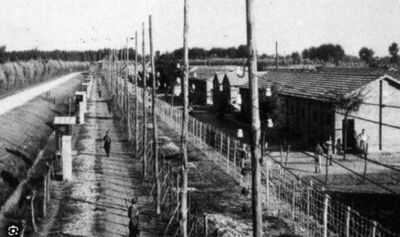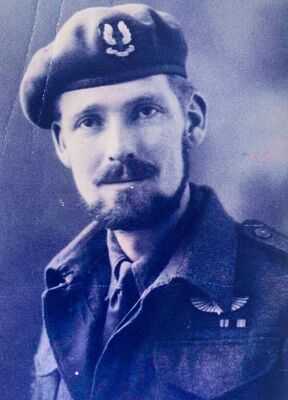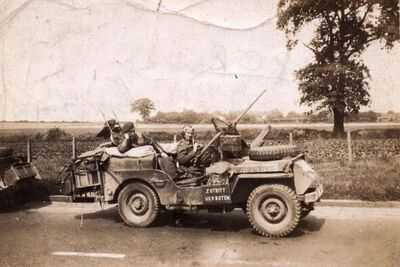The "greatest SAS mission of World War Two" came when Special Forces daredevils stole a train and used it to break into a concentration camp in southern Italy to free hundreds of prisoners of war. This staggering feat of bravery and in-genuity was kept secret for 45 years and, as a result, is little known today. As a mission, it signifies like no other the motto of the elite regiment, "Who Dares Wins," and is told in detail in Damien Lewis's new book SAS the Great Train Raid, which is out now.
It reveals for the first time the long-hidden aftermath of the raid deep into enemy territory during the Allied invasion of Italy in the autumn of 1943 and the six months that followed. The soldiers of 2 SAS, led by Major Oswald Cary-Elwes, were the first intofascist Italy to clear the way for landings at its southern ports by thrusting behind enemy lines to destroy rail tracks and stop the Nazis receiving supplies and reinforcements.
At the same time a Yugoslav prisoner called Zelcko Ljubo escaped from Pisticci, a brutal internment camp established by Mussolini's regime in 1939. It mirrored the Nazi death camps and imprisoned Jews, resistance fighters,intellectuals and priests. When Zelcko reached the Allied lines he told them his camp commandant was preparing to transfer Pisticci's inmates to Nazi Germany on trains, effectively condemning them to death.
So Maj Cary-Elwes and his deputy, fearless Franco-American Capt Robert Courard, devised the daring plan to hijack one of the trains and, with armed SAS troops and Zelcko as their guide, drive it deep behind enemy lines to liberate the PoWs before returning again.
On September 15, 1943, they launched their assault on the camp and liberated 180 prisoners, many too weak to walk, while others were freed and told to hide in the hills until Allied forces arrived.
Other key figures in the mission that appropriately became known as Operation Loco were Lt Allister McGregor, whose troops called him "The Boss", and one of his squad, Trooper George Arnold, who was diminutive in stature at 5ft 5ins tall, but larger than life in every other way.

They both took part in the train raid and were also part of a later mission sanctioned by wartime leader Sir Winston Churchill to find escaped prisoners hiding in the hills of southern Italy and bring them to safety. As they were only supposed to spend 10 days there, they were not equipped with radios and had only minimal rations and ammunition. They spent six months with no back-up rescuing hundreds of people and finding supplies where they could.
Tpr Arnold was the last British man out of Italy and had been presumed dead. His regiment thought he was a ghost when he walked back into his SAS base in Scotland. No medals were awarded for the mission and it was only in 1968 that it got a short mention, with a cartoon of the train raid in the Rover and Wizard Annual under the headline "Who Dares Wins".
Pisticci was the first concentration camp the Allies discovered during the war and it was kept secret due to fears of demonising the Germans and preventing them from surrendering.
Lewis says: "This mission would have been so sensitive, I cannot stress that enough, as it's the first concentration camp the Allies came across. There's no shadow of doubt there was a political decision made on high that we were not going to demonise the enemy and publicise the concentration camps because it would prolong the war."
He adds: "That's 80 years ago, so we can now tell the truth and I'm glad we can." However, the mission had remained shrouded in mystery for so long that when Lewis started investigating, he found lots of half-truths and misinformation. That is until fate intervened and he was contacted by Joanne Hussey, 29 - the granddaughter of Tpr Arnold.
Her mother Debbie, 60, had bought her husband Peter, 66, a copy of Damien's previous book for his birthday. After seeing his email address on the back cover, Joanne contacted him about her grandfather, who had written his memoirs about Italy but only shown them to his family.
Damien says: "It's been a very tough one to unpick. To be honest with you, until meeting Debbie and reading her father's manuscript, it was tough."

For Debbie, who lives in the New Forest, helping to bring her dad's involvement in Operation Loco to light has been satisfying. He often talked about his time in the war but only shared that he had been on a train with a prince in Italy, who was one of the PoWs freed from Pisticci. Debbie says: "Dad was nearly 50 when I was born, so obviously he'd had a whole life before I came along, but he loved telling stories, particularly about the war.
"I guess he made some of them quite light-hearted, and this is something Irealised when I was married and my husband said Dad would tell these stories but Peter had no idea they were about the war.
"He did tell a story about being on a train and meeting a prince, but we had no idea he had stolen the train and that this was in occupied Italy."
Her father had left school aged 14 to work as a shoemaker in Norwich before enlisting aged 16 and joining a cavalry regiment posted to North Africa, which is where he met Lt McGregor. They both joined the SAS in July 1943.
Debbie has fond memories of marching to the wartime song It's a Long Way to Tipperary with her father in North Wales, where she grew up.
He had few possessions from the war but one was a memoir covering his six months behind enemy lines in Italy, which she shared with Damien. It contained a scene where Tpr Arnold was captured by the Nazis and, while being marched to the next village, got chatting to a German sergeant who was older than him and had studied law at Oxford.
Along the route the sergeant offered him a cigarette and put his machine gun over his shoulder, allowing George to knee him in the groin and escape - with the following gunfire not exactly in his direction. Debbie says he believed the other man allowed him to flee.

For Damien the memoir breathed life into his unfinished book. He said: "To my mind there's only a few World War Two Special Forces' books written by those who were there. That's why we had to get it [the memoir] published.
"I think it's the greatest SAS mission of World War Two. There's no other in terms of audacity and daring and thinking the unthinkable and doing the unthinkable.All those things that the SAS became renowned for, nothing comes close. It's the zenith of everything the unit was set up to epitomise."
He adds: "What sets it apart after the train raid is that I've never come across individuals who are sent on a 10-day mission and end up six months behind enemy lines, literally living off the land and robbing and stealing from the bad guys, from the local fascists. It's a level of freelance maverick operation that I don't think there's anything to compare with."
After seeing one of his previous books, The Ministry of Ungentlemanly Warfare, adapted into a Hollywood blockbuster starring Henry Cavill, Damien is adamant that The Great Train Raid deserves similar treatment. "I can't imagine that we're not going to have some kind of film made about it," he says. "It's got to be."
- SAS The Great Train Raid by Damien Lewis (Quercus, hardback £22) is out now. Click here for details of his book tour
You may also like

Andhra: YSRCP slams TDP-led coalition for 'failure' in cyclone Montha relief

Tipu Sultan pistols, Maharaja Ranjit Singh painting set auction record in UK

Golden State Warriors vs Milwaukee Bucks regular season injury report: Who's playing, who's out, and more (October 30, 2025)

[WATCH] Women's World Cup 2025: 'Bat nahi laga' - Smriti Mandhana in disbelief after dismissal against Australia

ED raids Kolkata, Bhopal, Lucknow; seizes Rs 3 crore, attaches assets worth Rs 111 crore







